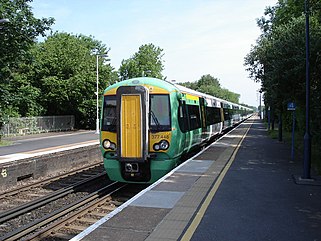London to Brighton line
| Brighton Main Line | |
|---|---|

A Southern class 377 Electrostar at Hassocks.
|
|
| Overview | |
| Type | Commuter rail, Suburban rail |
| System | National Rail |
| Status | Operational |
| Locale |
Greater London South East England |
| Termini |
London Bridge London Victoria Brighton |
| Operation | |
| Opened | 1841 (fully) |
| Owner | Network Rail |
| Operator(s) |
Govia Thameslink Railway Great Western Railway London Overground |
| Depot(s) | Selhurst Brighton Lovers Walk |
| Rolling stock |
Class 165 "Turbo" Class 166 "Turbo Express" Class 171 "Turbostar" Class 319 Class 377 "Electrostar" Class 378 "Capitalstar" Class 387 "Electrostar" Class 442 "Wessex Electric" Class 455 Class 700 |
| Technical | |
| Number of tracks | 2-4 |
| Track gauge | 4 ft 8 1⁄2 in (1,435 mm) standard gauge |
| Electrification | 750 V DC third rail |
| Operating speed | 90 mph (140 km/h) maximum |
The Brighton Main Line (also known as the South Central Main Line) is a British railway line divided in the north into two sections running from London Victoria and London Bridge to Brighton. It is about 51 miles (81 km) long, and is electrified throughout. Nearly all passenger trains are provided by Govia Thameslink Railway which operates the Southern, Gatwick Express and Thameslink brands. A small section has Great Western Railway services, currently sole operator of the line from Gatwick Airport to Reading, Berkshire known as the North Downs Line. The many Sussex services to Central London use the line and generally its branches as do south London, East Surrey and Tonbridge, Kent services.
There were six original proposals to build a railway between London and Brighton. The London and Brighton Railway (L&BR) emerged with an Act of Parliament of 15 July 1837 after a prolonged and expensive battle, with the most direct route, from the London and Croydon Railway (L&CR) at Norwood Junction to Brighton, using the L&CR from Norwood to London Bridge. A condition required by Parliament was that the railway should share its line between Croydon and Redhill with the South Eastern Railway main line to Dover. This clause gave rise to 60 years of disputes between the two companies.
...
Wikipedia
